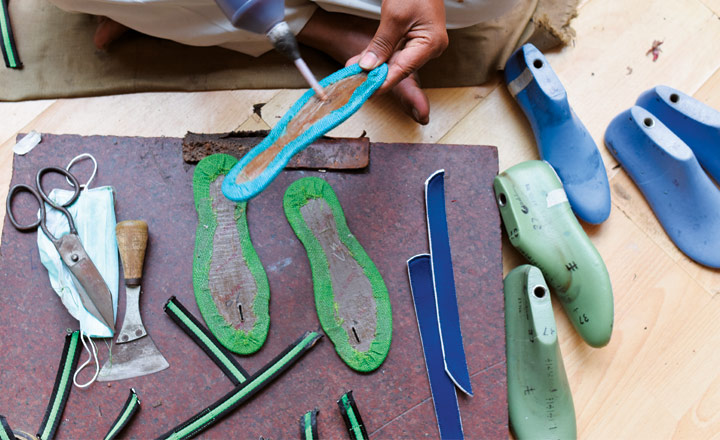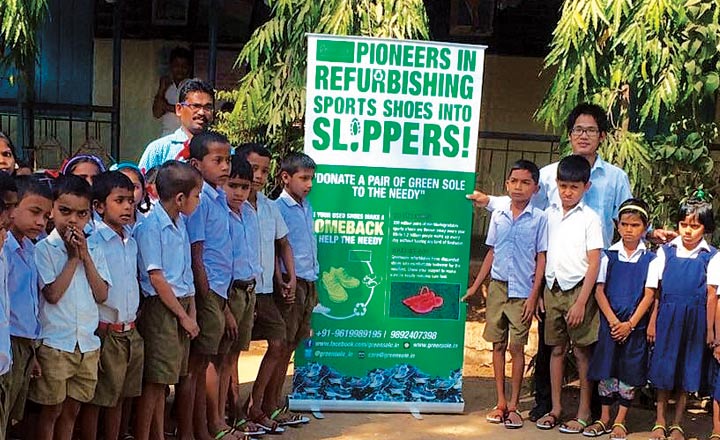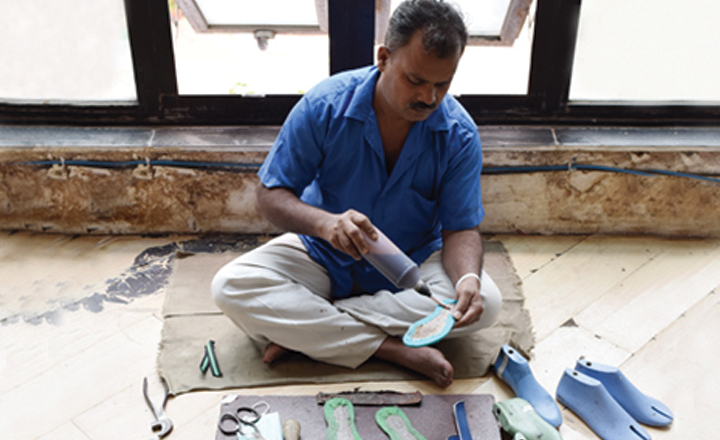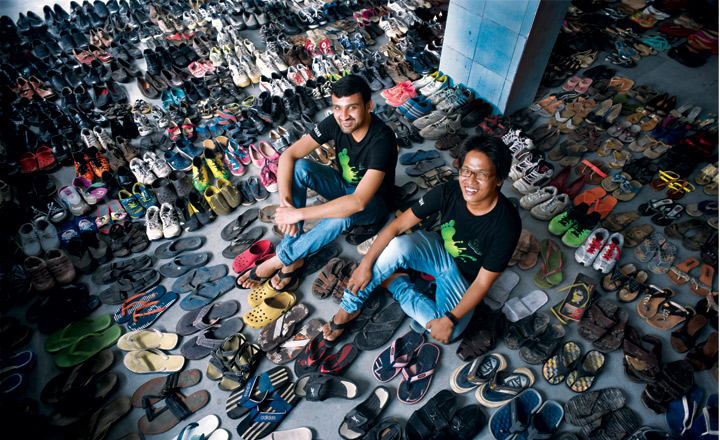It’s a rocky, uneven path, full of pebbles and stones. Yet the children walk barefoot from the village to the school, on the outskirts of Talasari village in Maharashtra. The elders, battling the harsh sun, fare no better — their heels cracked and full of calluses — from the multiple outings. A simple chappal could alleviate some of the pain, but seldom can these villagers afford it.
Green Sole is changing this, one village at a time. Founded by Shriyans Bhandari and Ramesh Dhami, the company recycles old and discarded shoes into eco-friendly sandals and distributes it to those who can’t afford it.
Off and running
Hailing from Uttarakhand, the dream of becoming the next Shahrukh Khan brought Dhami to Mumbai. Living on the streets till he found a job in a restaurant, the co-founder probably relates to having little or no money. “There were days when I used to sniff whitener so that I wouldn’t feel hungry. Then, post rehabilitation and counselling, I got involved in physical activities. I started running and it became a turning point in my life,” he says.
In fact, the founders, both athletes, were practicing for marathons when they realised that they discarded 5-6 pairs of shoes every year. Dhami says, “I had bought a pair of shoes for a marathon but they lasted just a few months. I didn’t want to throw them out as I had paid a lot for them. Using a knife, I made a slipper by removing the uppers.”

The successful experiment got Dhami thinking. Meanwhile, Bhandari, a management graduate, found that every year about 350 million pairs of shoes are discarded across the world. In contrast, about 1.5 billion people are infected by life threatening diseases such as Elephantiasis and Tungiasis, contracted through contaminated soil and water — diseases that can easily be prevented by using proper footwear. Then why don’t people spend a little on them? “People spend money on food and clothes, but they find it unnecessary to spend on footwear. So it’s ignorance, more than affordability,” says Bhandari.
That may be. But the gap between the number of discarded shoes and those without any was huge — something that could be exploited. The duo, thus, started researching recycling techniques, and built a prototype. To get a holistic view of the industry, they learnt the art of designing and crafting footwear at the Footwear Design and Development Institute in Kolkata. Eventually, with the help of Entrepreneurship Development Institute of India, they set up Green Sole in June 2015.
While most of the initial investment of Rs.20 lakh came through winning competitions like Eureka at IIT Bombay in January 2015 and Masterplan at IIM Ahmedabad, the rest was raised from Ram Fashion Exports and through crowdfunding. “It was a very organic way for us to collaborate with Green Sole since we both work with the same product. Green Sole hits many targets with one aim,” says Nitesh Bhasin, director, Ram Fashion Exports. For Green Sole, the association has provided the necessary equipment for R&D, helping bring down production costs. “Our running costs are low unlike other start-ups,” says Bhandari, adding that others only begin to worry about this when they start growing. Among the many contributors in crowdfunding, Keith Rollag, associate professor of management, Babson College, says, “As a teacher, I have seen many students starting their own ventures. But, this model has an important social aspect to it.”
Bring on the shoes
So far, the company has distributed about 10,500 pairs of slippers across villages in Maharashtra. Dhami and Bhandari aim to take this to 50,000 pairs by the end of this year. But, how do they get the shoes? Green Sole conducts shoe collection drives to get their hands on old pairs. It has partnered 18 corporates including Rolls Royce, L&T, Tata Power and DTDC, who pay Rs.200 for each pair donated to the poor, as a part of their corporate social responsibility initiative. “Maximum donation happens between January and March since it is the last quarter of the financial year and corporates allot funds,” shares Bhandari.
With big players such as Puma, Crocs and Skechers, the company not only gets the discarded and rejected lot but also $3 per pair. Besides, the company has installed collection boxes at Priyadarshini Park and Chandivali in Mumbai, and has a huge volunteer base in places like Bengaluru, Kolkata and Indore. It is now trying to associate with local ragpickers for sourcing old shoes on a commission basis.
 The villages to donate to are decided with the help of NGOs and schools. But that’s not all. The company also sells the refurbished footwear online and through events and exhibitions, with the price ranging from Rs.500-1,000. It has already tied up with Puma for ‘Green Sole Puma’ sandals, which are retailed across the German footwear maker’s stores across the country. The duo is eyeing more such partnerships with players like Nike, Adidas and Levi’s to expand sales.
The villages to donate to are decided with the help of NGOs and schools. But that’s not all. The company also sells the refurbished footwear online and through events and exhibitions, with the price ranging from Rs.500-1,000. It has already tied up with Puma for ‘Green Sole Puma’ sandals, which are retailed across the German footwear maker’s stores across the country. The duo is eyeing more such partnerships with players like Nike, Adidas and Levi’s to expand sales.
As of now, with 30 minutes required to refurbish a pair of slippers, Green Sole produces 240 pairs every day. The company has so far sold 3,000 sandals, earning Rs.40 lakh, which includes the money earned through corporate donations. Going ahead, Green Soles is planning to sell 1,500 pairs every month.
Expanding the platform While helping the needy is Green Sole’s main objective, the other is conserving the environment. Many petroleum-based products are used to manufacture athletic shoes, which result in pollution of groundwater and rivers when disposed into landfills, says Bhandari. Recycling the shoes not just reduces the waste in landfills it also cuts down carbon emissions. During their research, the duo found that manufacturing soles for a single pair of shoes emits about 30 lbs of carbon. By re-using the soles, Green Sole gets carbon credits. Auditors from California measure the emissions the company is able to reduce, shares Bhandari. With this twin approach, the company is looking to take the project overseas to places like Jamaica and across Africa, where the problem of Elephantiasis is severe. It is also planning to set up a small manufacturing unit in Jamaica to start with.
While helping the needy is Green Sole’s main objective, the other is conserving the environment. Many petroleum-based products are used to manufacture athletic shoes, which result in pollution of groundwater and rivers when disposed into landfills, says Bhandari. Recycling the shoes not just reduces the waste in landfills it also cuts down carbon emissions. During their research, the duo found that manufacturing soles for a single pair of shoes emits about 30 lbs of carbon. By re-using the soles, Green Sole gets carbon credits. Auditors from California measure the emissions the company is able to reduce, shares Bhandari. With this twin approach, the company is looking to take the project overseas to places like Jamaica and across Africa, where the problem of Elephantiasis is severe. It is also planning to set up a small manufacturing unit in Jamaica to start with.
Besides, to generate interest in the venture, the company is trying to get celebrities to donate their old shoes and then auction the refurbished ones. Dhami and Bhandari share that Barack Obama and Ratan Tata have evinced interest.
The task now is to provide footwear to 20,000 rickshaw pullers in Kolkata, who walk barefoot in the city. The long-term plan, the duo share, is to ensure no one walks barefoot anywhere in the world by 2023. This might or might not happen, but if the beaming faces of Talasari children in their new flip flops are an indication, more smiles are in store. And Green Sole will be the ‘sole’ cause for it.











